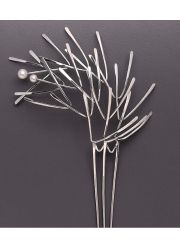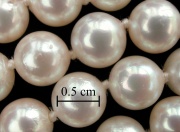Difference between revisions of "Pearl, cultured"
(username removed) |
|||
| (11 intermediate revisions by 3 users not shown) | |||
| Line 1: | Line 1: | ||
| + | [[File:Cultured pearl brooch.jpg|thumb|Branching Comb<br>MFA# 1986.912]] | ||
[[File:Cult.Pearl.jpg|thumb|Cultured pearls]] | [[File:Cult.Pearl.jpg|thumb|Cultured pearls]] | ||
== Description == | == Description == | ||
| − | A pearl produced by inserting a bead into a pearl oyster. As early as the 13th century, Chinese were inducing the growth of freshwater pearls. A viable commercial process for culturing pearls was patented in 1896 by Kokichi Mikimoto in Japan. The process involves placing a [ | + | A pearl produced by inserting a bead into a pearl oyster. As early as the 13th century, Chinese were inducing the growth of freshwater pearls. A viable commercial process for culturing pearls was patented in 1896 by Kokichi Mikimoto in Japan. The process involves placing a [[mother-of-pearl|mother-of-pearl]] bead into the mantel of a live oyster. Over the period of a few years, the oyster covers the bead with several layers of [[nacre|nacre]]. This produces uniform, spherical pearls. The primary sources for cultured pearls are Japan and Australia with smaller producers found in China and Fiji. [[X-radiography|X-radiography]] is used to measure the thickness of the nacre layer and differentiate between natural and cultured pearls. |
== Synonyms and Related Terms == | == Synonyms and Related Terms == | ||
| − | cultured pearl; seed pearls (less that 0.25 grains); perla cultivada (Esp.); perle de culture (Fr.); | + | cultured pearl; seed pearls (less that 0.25 grains); perla cultivada (Esp.); perle de culture (Fr.); pérola de cultura (Port.) |
| − | == | + | == Risks == |
| − | + | * Easily damaged by acids. | |
| + | * Deteriorates at low humidities. | ||
| + | * Easily scratched. | ||
| + | * May be discolored by soap or skin oil. | ||
| − | + | == Physical and Chemical Properties == | |
| − | Color: white, pale yellow, pink, gray, brown, black | + | * Texture: slightly rough |
| + | * Luster: pearly (iridescent) | ||
| + | * Color: white, pale yellow, pink, gray, brown, black | ||
| + | * Most exhibit a sky-blue color fluorescence | ||
| + | * Mohs Hardness = 3 - 4 | ||
| + | * Density = 2.70-2.79 | ||
| − | + | == Resources and Citations == | |
| − | + | * Pearl: [http://www.geo.utexas.edu/courses/347k/redesign/gem_notes/pearl/pearl_main.htm Website] | |
| − | |||
| − | |||
| − | |||
| − | |||
| − | |||
| − | |||
| − | |||
| − | + | * Oppi Untracht, ''Jewelry Concepts and Technology'', Doubleday & Co., Inc., New York City, 1985 | |
| − | + | * Website: http://www.geo.utexas.edu/courses/347k/redesign/gem_notes/Pearl/pearl_triple_page.htm | |
| − | + | * Wikipedia: http://en.wikipedia.org/wiki/Pearl (accessed Dec 20 2004) | |
| − | |||
| − | |||
| − | |||
| − | |||
| − | |||
| − | |||
| − | |||
| − | |||
| − | |||
| − | * Wikipedia | ||
[[Category:Materials database]] | [[Category:Materials database]] | ||
Latest revision as of 15:44, 17 October 2022
Description
A pearl produced by inserting a bead into a pearl oyster. As early as the 13th century, Chinese were inducing the growth of freshwater pearls. A viable commercial process for culturing pearls was patented in 1896 by Kokichi Mikimoto in Japan. The process involves placing a Mother-of-pearl bead into the mantel of a live oyster. Over the period of a few years, the oyster covers the bead with several layers of Nacre. This produces uniform, spherical pearls. The primary sources for cultured pearls are Japan and Australia with smaller producers found in China and Fiji. X-radiography is used to measure the thickness of the nacre layer and differentiate between natural and cultured pearls.
Synonyms and Related Terms
cultured pearl; seed pearls (less that 0.25 grains); perla cultivada (Esp.); perle de culture (Fr.); pérola de cultura (Port.)
Risks
- Easily damaged by acids.
- Deteriorates at low humidities.
- Easily scratched.
- May be discolored by soap or skin oil.
Physical and Chemical Properties
- Texture: slightly rough
- Luster: pearly (iridescent)
- Color: white, pale yellow, pink, gray, brown, black
- Most exhibit a sky-blue color fluorescence
- Mohs Hardness = 3 - 4
- Density = 2.70-2.79
Resources and Citations
- Pearl: Website
- Oppi Untracht, Jewelry Concepts and Technology, Doubleday & Co., Inc., New York City, 1985
- Wikipedia: http://en.wikipedia.org/wiki/Pearl (accessed Dec 20 2004)

